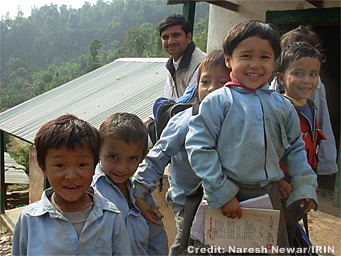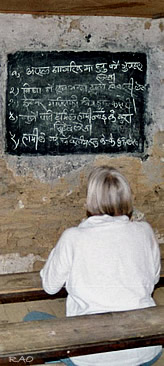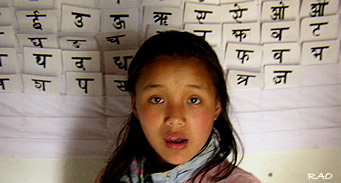|
Nepal
in Crisis 2006: Human Rights
|
|
Peace
agreement leads to improved school security
|
 |
NILKANTA,
12 Dec 2006 (IRIN)
Smiling
behind her desk, school teacher Sabita Adhikari is thrilled to see all
40 of her fourth grade students in class. "Nobody is absent anymore. It's
because children feel safe to travel from their villages to attend class,"
said Adhikari who teaches at Sri Bal Mandir Secondary School in Nilkanta
village in Dhading district, nearly 100 km south of the capital.
 |
| <<
Improved security in rural areas means children can attend school without
fear of abduction or attack
Until
November's peace agreement, which brought a decade-long conflict to an
end, many rural children were afraid to come to school for fear of being
abducted by Maoist rebels for 'indoctrination' training, or being forced
to shoulder a rifle in the People's Liberation Army (PLA).
But
in May, the rebels called a ceasefire following the end of direct rule
by Nepalese monarch, King Gyanendra, and started peace talks with the new
interim government of seven national parties. |
|
 |
| Subsequent
peace talks led to the signing of a historic peace agreement bringing an
end to the armed conflict which killed over 14,000 Nepalese people, according
to the National Human Rights Commission (NHRC).
The
process for management of arms and armies of both the Maoists and the Nepalese
state has already started, according to government officials, with the
cantonment of Maoist soldiers and the confinement of Nepalese Army (NA)
personnel inside their barracks now under way.
"Education
was the most affected sector [by the conflict] and children were most vulnerable,"
said Sri Ram Aryal, Principal of Mindukta Primary School.
He
added that the current management and monitoring of arms and armies has
assured better security for villagers, with children now largely able to
walk to school without fear of being abducted by Maoists or caught in skirmishes
between them and security forces.
"The
most visible change among children in this district is the lack of stress
and trauma among them," said schoolteacher Adhikari.
Teachers
like her also feel life has improved with the peace process. "It's a relief
that we don't have to fear for our lives or pay taxes to the rebels anymore
and now we can focus more on how best to educate our children," she added. |
|
 |
| According
to local human rights group, Insec, hundreds of teachers were internally
displaced from their homes, abducted, tortured and killed at the hands
of the Maoists for failing to support their rebellion.
Teaching
staff, like many Nepalese civilians, also suffered arbitrary arrests and
illegal detentions and torture at the hands of the government's security
forces on suspicion of supporting the rebels, Insec added. |
|
"We
don't see any armed people, whether from the Maoists or the Nepalese Army,
in our villages - that's a wonderful feeling that we have not had for 10
years," said Parbati Adhikari, Principal of Sri Bal Mandir Secondary School.
Credit
IRIN 2006
Copyright
© UN Office for the Coordination of Humanitarian Affairs 2006
[
This report does not necessarily reflect the views of the United Nations]
Integrated
Regional Information Networks (IRIN), part of the UN Office for the Coordination
of Humanitarian Affairs (OCHA).
|
Links
|
 |

|
 |
|
Nepal
Education
|
.

|








